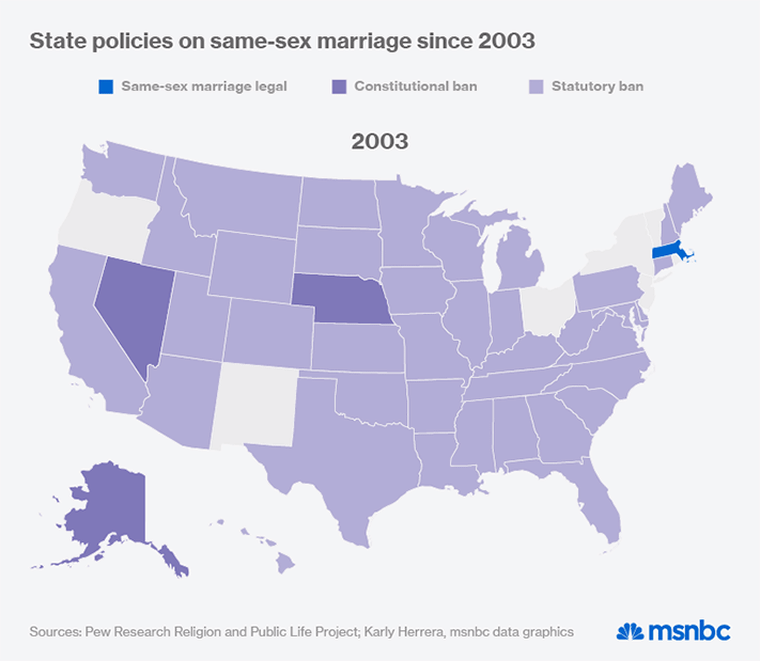The nation’s highest court has found that the U.S. Constitution requires states to license and recognize marriages between two people of the same sex, making marriage equality officially — after decades of litigation and activism — the law of the land.
Justice Anthony Kennedy authored the landmark opinion, which was handed down on Friday, writing that “no union is more profound than marriage, for it embodies the highest ideals of love, fidelity, devotion, sacrifice, and family.” He was joined by Justices Ginsburg, Breyer, Sotomayor and Kagan.
Each of the court’s conservative justices — Scalia, Thomas, and Alito — as well as Chief Justice John Roberts, meanwhile, wrote his own dissent.
The decision comes as the pinnacle of the modern gay rights movement, which began in earnest with the Stonewall riots nearly 50 years ago. It also caps off two short years of striking progress that saw the number of states with legalized marriage equality skyrocket from single digits to 37 states, plus the District of Columbia. Friday’s decision means that the remaining same-sex marriage bans in 13 states cannot stand.
”Sometimes, there are days like this — when that slow, steady effort is rewarded with justice that arrives like a thunderbolt,” President Obama said in a televised address from the Rose Garden, speaking to the marriage equality movement’s remarkable pace of change. He is widely regarded as the most LGBT-friendly president in history.
This case before the court this session, Obergefell v. Hodges, was brought on behalf of same-sex couples either fighting to marry, or to have their marriages recognized in four separate states: Ohio, Kentucky, Michigan and Tennessee. At issue was whether those states’ same-sex marriage bans violated the 14th Amendment of the U.S. Constitution.
The 6th Circuit Court of Appeals found that those bans were, in fact, constitutional. It was the only federal appellate court to rule against same-sex couples since 2006. But Friday’s decision from the high court reversed that conclusion, clearing the way for gay and lesbian couples to begin marrying in all 50 states.
“In forming a marital union, two people become something greater than once they were,” Kennedy wrote in the 34-page opinion, which used the word “dignity” nine times.
“It would misunderstand these men and women to say they disrespect the idea of marriage. Their plea is that they do respect it, respect it so deeply that they seek to find its fulfillment for themselves,” Kennedy continued. "Their hope is not to be condemned to live in loneliness, excluded from one of civilization’s oldest institutions. They ask for equal dignity in the eyes of the law. The Constitution grants them that right.”
RELATED: 2016 GOP hopefuls hit different tones in gay marriage response
Chief Justice Roberts, meanwhile, accused the majority of “sully[ing] those on the other side of the debate.”
“If you are among the many Americans— of whatever sexual orientation — who favor expanding same-sex marriage, by all means celebrate today’s decision. Celebrate the achievement of a desired goal. Celebrate the opportunity for a new expression of commitment to a partner. Celebrate the availability of new benefits. But do not celebrate the Constitution. It had nothing to do with it,” the chief justice wrote.
In a separate, scathing dissent, Scalia referred to the decision as a “judicial Putsch” that pre-empted the ongoing debate over same-sex marriage that had been taking place in legislatures and voting booths.
“The opinion is couched in a style that is as pretentious as its content is egotistic,” Scalia wrote, saying that the majority “discovered in the Fourteenth Amendment a ‘fundamental right’ overlooked by every person alive at the time of ratification, and almost everyone else in the time since.”
Scalia also noted the court is “strikingly unrepresentative” of the country as a whole. “To allow the policy question of same-sex marriage to be considered and resolved by a select, patrician, highly unrepresentative panel of nine is to violate a principle even more fundamental than no taxation without representation: no social transformation without representation,” he wrote.
Friday’s 5-4 decision comes just two years after the 2013 case of United States v. Windsor, which invalidated a key portion of the federal Defense of Marriage Act (DOMA) and allowed for the U.S. government to begin recognizing legally valid same-sex marriages. That ruling, which repeatedly affirmed the equal dignity of gay and lesbian couples, dramatically accelerated the pace of the gay rights movement and became the basis for federal decisions that brought down same-sex marriage bans in nearly two dozen states.
RELATED: Obama calls gay marriage ruling a ‘victory of America’
While undoubtedly historic, Friday’s ruling likely came as no surprise to many. In October, the Supreme Court rejected appeals to hear marriage equality cases out of three different federal circuits, clearing the way for gay and lesbian couples to marry in 11 more states. Additionally, over the last 27 years on the high court, Kennedy has authored some of the most important rulings in the history of the gay rights movement — Romer v. Evans, which found that a state could not prohibit gay people from receiving protection against discrimination; Lawrence v. Texas, which found anti-sodomy laws unconstitutional; Windsor, which gutted DOMA; and now, Obergefell, the final chapter of his legacy as the Supreme Court’s greatest gay rights advocate.
Friday’s date — June 26 — is also the anniversary of the Windsor and Lawrence decisions.
Speaking at a press conference on the steps of the Supreme Court shortly after the decision was handed down Friday, Jim Obergefell, the named plaintiff in the suit, said he felt his late husband, John Arthur, was with him in that moment.
“Today’s ruling affirms what millions already knew,” Obergefell said. “Our love is equal.”
